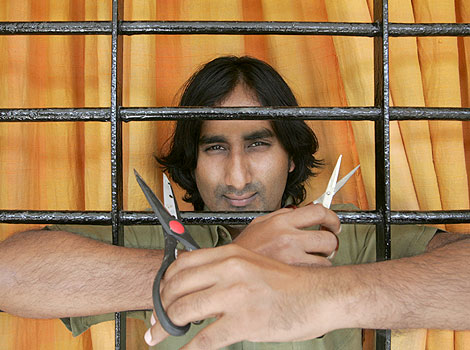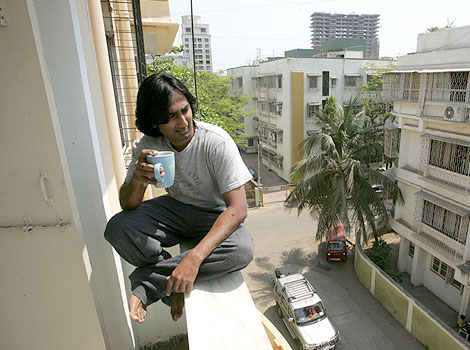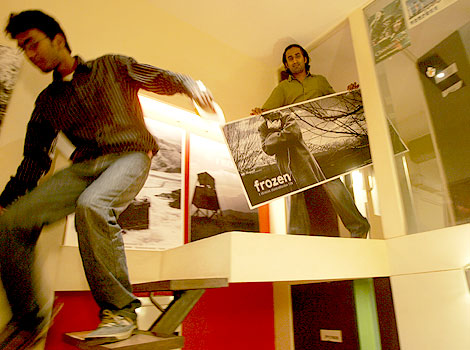First shot, flashback: A dark theatre. A child weeps bitterly as Amitabh Bachchan dies one of his heroic deaths.

Nothing unusual, one would say, even adults sob into their handkerchiefs when something tragic happens in films. But this was one of Shan Mohammed’s early brushes with his calling at an age when ‘A’ stood for both apple and Amitabh.
Second shot, 24 years later, sometime in last month: A dark corridor in a three-storied apartment; a man with long locks and a baritone introduces himself as the editor of Abbas Tyrewallah’s forthcoming filmJaane Tu…Ya Jaane Naa.

It’s a successful Shan now in deep focus. But unlike his on-screen counterparts, he doesn’t flaunt his laurels. He embodies a segment of youth that has made it big in the flourishing Hindi film industry. Bollywood has become daring. It is experimenting with themes, narrative styles, cast as well as the look and colour of films. The gamble has paid off. Young people are in demand in every department of filmmaking: writing, direction, editing, acting, costumes, set design and special effects.
“Cut it,” snapped Shan, the editor, visibly embarrassed. “This is my story, not a film script.”
Shan wanted his story to be told without the dramatic frills.
Jaane Tu…, an Aamir Khan production that launches the actor’s nephew Imran Khan was Shan’s first exposure to a mega-bucks project.
“I met Tyrewallah through Raghav Dar, a friend who is now assisting Sanjay Leela Bhansali,” said Shan. “When I read the script, I fell in love with it. I enjoyed working with the director. He is open to ideas and quite flexible.”
Shan didn’t exactly stumble into films. This commerce graduate had gone to Chennai for his articleship when he bumped into renowned cinematographer PC Sreeram at a photo exhibition. For a guy from the Bhilai steel township, filmmaking was a mystery. “Sreeram, upon knowing my interest in films, asked me to assist someone in Mumbai. I was clueless then; didn’t know what to do, whom to approach,” he said.
After coming to Mumbai, he started staying with a school friend whose grandfather had some connections in the film world. Soon Shan was working with Pankaj Advani on a series of 10-minute films titled Bheja Fryfor Channel V.
The first turning point came in 2000 when he got in to Pune’s Film and Television Institute of India (FTII) in the editing course. Those were the years when he saw the best of Indian and world cinema.

“Even as an editing student I was trying to make forays into Bollywood,” Shan said. “I used to come to Mumbai to edit documentaries, which helped me pay my course fee.” He also got friendly with cinematographer Shankar Raman. During his second year at the film school, Raman introduced him to young filmmaker Sarthak Dasgupta, who was doing his first film called The Great Indian Butterfly. Shan edited this road movie that featured Sandhya Mridul and Aamir Bashir.
More documentaries followed, and finally in third year, Frozen happened. Frozen, a black-and-white feature film, by director Shivaji Chandra Bhushan, was shot in Ladakh during winter.
“It was a great learning experience. About 80 per cent of the film was reconstructed on the editing table. It went on to win five jury awards at various international festivals including Toronto, London and Los Angeles. In India, at the Osean Film Festival last year, it bagged the best jury award,” said Shan, beaming with pride. This year’s MAMI festival also has Frozen on its list.
Shan today commands a six-figure monthly salary, and people are willing to oblige. Tyrewallah has only good things to say: “What’s striking about him is his temperament. He will never lose his cool even when people around him are tearing their hair out. He is also extremely self-motivated and disciplined, and that makes a director’s job easy.”
The other vital thing that Tyrewallah probably doesn’t know is Shan’s ability to keep secrets. Even after coaxing him for a good 15 minutes, all that the editor would say about his next snip job was: “It’s a bilingual period film in Hindi and Tamil; shooting will begin some time in May.”
“Time for pack-up,” said Shan. He would want eight-hours sleep to wade through the rushes the following day.
source: http://www.hindustantimes.com / Hindustan Times / Home> India News> India / by Pratik Ghosh, Hindustan Times / Mumbai – March 13th, 2008








